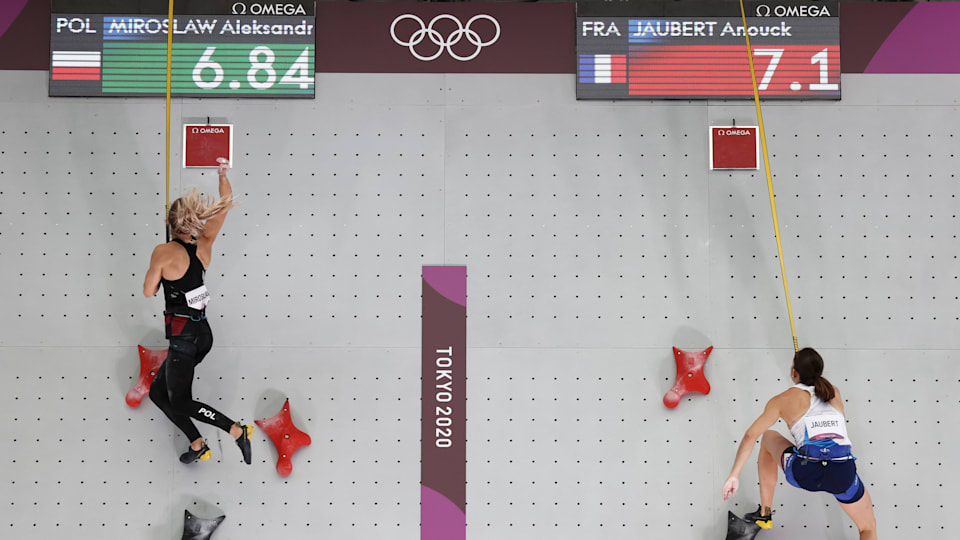
Usian Bolt, still the fastest man to ever live, set the Olympic record in the men’s 100m with a time of 9.63 seconds at the Olympic Games London 2012. While it was a lightning-quick time, it may be more than double the time needed to be crowned the fastest male climber in the world at Paris 2024.
On 12 April, American climber Samuel Watson set the new men’s speed climbing world record at a mere 4.79 seconds. The feat secured his status as one of the favourites to win a medal at Paris 2024, but it also raised the profile of speed climbing itself.
The vertical racing event will make its Olympic debut as a stand-alone discipline for men and women at Paris 2024. Characterised by its iconic red hand holds, cutthroat format and frenetic movements, speed climbing will certainly turn heads during the upcoming Games.
Olympics.com has assembled an essential guide to speed climbing in anticipation of Paris 2024. Read on to find out more about the fastest vertical event at the Olympic Games.
Speed climbing 101: the basics
Speed climbing utilises a standardised route designed by French route setter Jacky Godoffe in the early 2000s. It is the same at every speed climbing competition around the world sanctioned by the International Federation of Sport Climbing.
The route features 20 hand holds and 11 foot holds. The holds are identical throughout the route, unlike boulder and lead climbing.
The purpose-built speed climbing wall is 15 metres in length with a five degree overhang. It features two identical lanes. The athletes are clipped into a rope hung from the top of the wall.
Climbers start their timed ascent by placing one of their feet on a timing plate. They can begin climbing after the third beep from the automatic timing system. Their ascent is finished once they slap the touchpad at the top of the route, or once they fall off the wall.
Speed climbers will have topped the route hundreds of times before competing at the Olympic Games. While the route has been around for a long time, athletes are still finding new ways to shave milliseconds off their times.
Muscle memory, technique and physical power are critical components of a successful speed climber.
Competition format for speed climbing at Paris 2024
Speed climbing competitions will take place over multiple days at Paris 2024. The first phase of the event is the qualification round.
Speed climbers will get one attempt to climb each lane during the qualification round. Their fastest time counts towards the qualification ranking. The ranking will be used to seed climbers for the first phase of the elimination rounds.
The elimination rounds consist of head-to-head single elimination races. With no second run to rely on, mistakes will be critical during this part of the competition.
The first elimination round features seven head-to-head races. The winner of each race advances to the quarterfinals, along with the “lucky loser.” The “lucky loser” is the losing climber with the fastest time.
There are no second chances available once the quarterfinals begin. Athletes will need to win three head-to-head matchups if they want to claim the gold medal.
A false start will be fatal to an athlete’s chance of advancing further in the competition, which means climbers will need to take extra care at the start of each race.
The cutthroat nature of the competition format will create a tense, but exciting atmosphere around speed climbing at Paris 2024.
Speed climbing at the Olympic Qualifier Series
A few athletes have already secured quotas for their national Olympic committees via the world championships and continental championships. The remaining athlete quotas will be distributed using the results of the Olympic Qualifier Series*.
The Olympic Qualifier Series, in Shanghai from 16-19 May and Budapest from 20-23 June, brings together the sports of breaking, BMX freestyle, skateboarding and sport climbing. It offers Olympic qualification opportunities to athletes in each of the four sports.
A combined series ranking will be created from the results of the speed climbing competitions. It will be used to determine the remaining athlete quotas.
*As National Olympic Committees have the exclusive authority for the representation of their respective countries at the Olympic Games, athletes' participation at the Paris Games depends on their NOC selecting them to represent their delegation at Paris 2024.
Sport climbing at Paris 2024
Sport climbing will be held at the Le Bourget Sport Climbing Venue from 5-10 August. Competitions will be held in speed climbing and the combined event, which features boulder and lead climbing.

